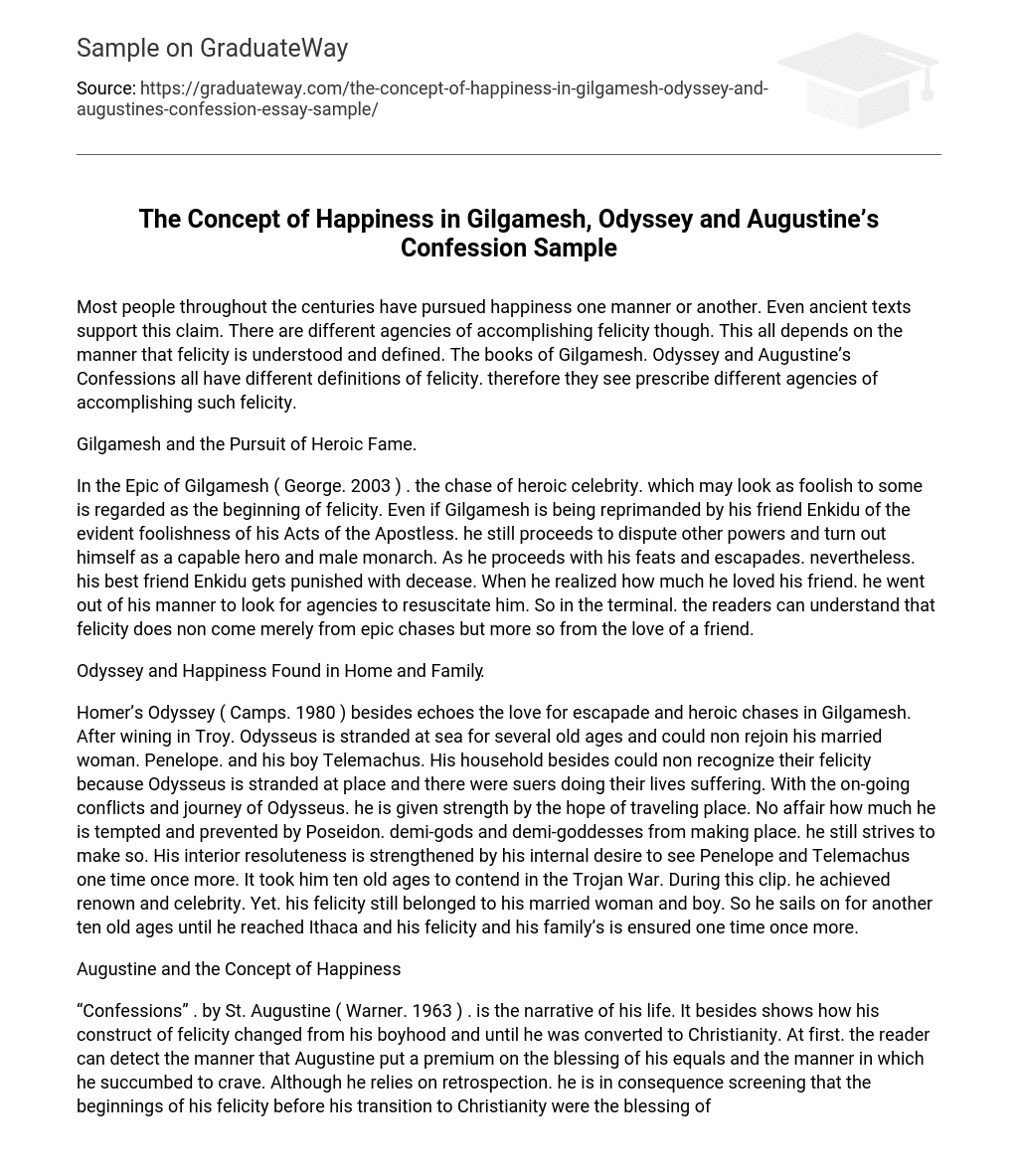Most people throughout the centuries have pursued happiness one manner or another. Even ancient texts support this claim. There are different agencies of accomplishing felicity though. This all depends on the manner that felicity is understood and defined. The books of Gilgamesh. Odyssey and Augustine’s Confessions all have different definitions of felicity. therefore they see prescribe different agencies of accomplishing such felicity.
Gilgamesh and the Pursuit of Heroic Fame.
In the Epic of Gilgamesh ( George. 2003 ) . the chase of heroic celebrity. which may look as foolish to some is regarded as the beginning of felicity. Even if Gilgamesh is being reprimanded by his friend Enkidu of the evident foolishness of his Acts of the Apostless. he still proceeds to dispute other powers and turn out himself as a capable hero and male monarch. As he proceeds with his feats and escapades. nevertheless. his best friend Enkidu gets punished with decease. When he realized how much he loved his friend. he went out of his manner to look for agencies to resuscitate him. So in the terminal. the readers can understand that felicity does non come merely from epic chases but more so from the love of a friend.
Odyssey and Happiness Found in Home and Family.
Homer’s Odyssey ( Camps. 1980 ) besides echoes the love for escapade and heroic chases in Gilgamesh. After wining in Troy. Odysseus is stranded at sea for several old ages and could non rejoin his married woman. Penelope. and his boy Telemachus. His household besides could non recognize their felicity because Odysseus is stranded at place and there were suers doing their lives suffering. With the on-going conflicts and journey of Odysseus. he is given strength by the hope of traveling place. No affair how much he is tempted and prevented by Poseidon. demi-gods and demi-goddesses from making place. he still strives to make so. His interior resoluteness is strengthened by his internal desire to see Penelope and Telemachus one time once more. It took him ten old ages to contend in the Trojan War. During this clip. he achieved renown and celebrity. Yet. his felicity still belonged to his married woman and boy. So he sails on for another ten old ages until he reached Ithaca and his felicity and his family’s is ensured one time once more.
Augustine and the Concept of Happiness
“Confessions” . by St. Augustine ( Warner. 1963 ) . is the narrative of his life. It besides shows how his construct of felicity changed from his boyhood and until he was converted to Christianity. At first. the reader can detect the manner that Augustine put a premium on the blessing of his equals and the manner in which he succumbed to crave. Although he relies on retrospection. he is in consequence screening that the beginnings of his felicity before his transition to Christianity were the blessing of his friends irrespective if the activities they were making together were right or incorrect. Then he went on to research secular passions and lecherousness. In the terminal. he converted to the Christian religion and declared that his felicity is found in being connected with God and prosecuting what God’s will in his life.
Mention
Camps. W. A. ( 1980 )An Introduction to Homer. Oxford: Clarendon Press.
George. A. R. ( 2003 ) . The Babylonian Gilgamesh Epic: Critical Edition and Cuneiform Texts. England: Oxford University Press.
Warner. R. ( 1963 ) . The Confessions of St. Augustine. New York: Penguin Books.





